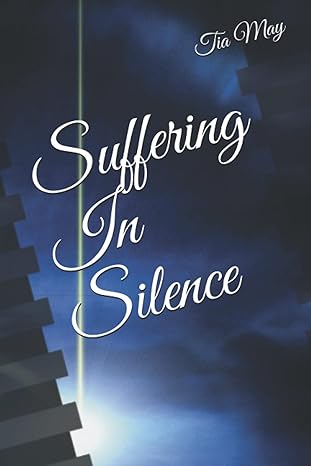
On Saturday, October 25, the Domestic Violence Committee of EPA will be hosting, “Out of the Darkness,” an online workshop focusing on healing from the trauma of domestic violence. Pastor Tia May, author of Suffering in Silence, will be the keynote speaker. I had an opportunity to sit down with her ahead of the workshop to learn more about her story and the invaluable work she is doing:
Pastor May never planned to do advocacy work. She never planned to write a book. But like many who find themselves called to various forms of ministry, she could not evade God’s voice. “I remember I went to bed one evening—I think it was a Tuesday—I went to sleep and I got up. I just woke up out of my sleep. I think it was like 2 or 3 o’clock in the morning and I just heard God say, ‘Write a book.’ He said, ‘write a book.’”

The subject matter of that book was deeply personal—Pastor May’s journey of healing from domestic violence at the hands of her ex-husband of nineteen years, a fellow clergy person. She admits, “quite honestly, I wanted to get through my own situation. I just wanted to be okay…so I could move forward and live my life.” But Pastor May could not help but listen when God so clearly called her to the ministry of sharing her story for the sake of others—not only other victims and survivors of domestic violence but also for church leaders and communities.
While Pastor May’s book is titled Suffering in Silence, our conversation revealed that her work also points to its beautiful counter truth: that healing comes through speaking the truth out loud. Speaking the truth, honestly and relentlessly, is a powerful antidote to the ignorance and disbelief that allow domestic violence to thrive.
The widespread reluctance to believe victims and survivors of abuse is a deeply troubling trend—one that the #MeToo movement, which went viral in 2017, powerfully exposed. Pastor May believes that reluctance comes from two places. First, she said, “there just needs to be more awareness. I believe some people just don’t know.” Domestic abuse “is not just limited to the physical activity of being hurt,” she said, naming that mental, emotional, financial and spiritual abuse all fall under its umbrella.
Second, Pastor May said, “I believe some people just don’t want to know.” The reality of domestic abuse is difficult, painful, ugly, and some—including in the church—choose to ignore it, especially when it challenges their picture of how things should be. Pastor May puts it starkly:
“This is not pretty. This is not the ministry where we have all the moms together baking cookies and, you know, we’re getting the kids together to play soccer and go play and the outreach ministry that everyone wants to come and participate in because we’re getting our pictures taken and everybody’s all lovely and happy. No, this isn’t pretty. We deal with men and women who are being hurt seriously, who are being killed. Their lives are being taken away. Everybody can’t handle that. Everybody doesn’t know what to do. I think it’s very, very easy to turn a blind eye and let somebody else handle it or just don’t say anything at all.”
Combating this ignorance—whether honest or willful—is a necessary step towards creating a safer world for victims and survivors. Because responding and responding well to those who are suffering abuse can make an enormous difference to their healing and resilience.
Pastor May can attest to this difference. In addition to surviving domestic violence, she has more recently experienced stalking. Stalking can take many forms—digital, verbal, or physical—and often carries the same patterns of control and intimidation as domestic abuse. In Pastor May’s case, the situation was compounded because her stalker impersonated a police officer, exploiting a position of perceived authority, not unlike her ex-husband’s status as clergy.
“What is starkly different,” she says, “is the support that I have. There was nobody around me that I could count on when I was dealing with my ex-husband. The church didn’t want to get involved. The church told me to stay married to him…But I can see today dealing with this stalking situation, there are so many awesome, wonderful people who have stood up to encourage me. When I didn’t have the strength, they had the strength for me.”
While the experience of being stalked initially made her want to retreat from public life, it has instead become another layer of her ministry. “I wanted to quit,” she said, “and I had many, many people who said whatever you decide to do, I’m going to support you but just don’t make a decision right now. Let’s just wait. Let’s just pray.”
Pastor May is grateful that amidst a scary situation, she didn’t make a decision based in fear which, she says “is something that I also try to help people not to do when I’m helping them, so it was just beautiful for me to be able to receive that from others.” Pastor May is now speaking out about the legal and systemic issues surrounding stalking, bringing the same courage she showed in Suffering in Silence to this new aspect of advocacy.
Pastor May’s experiences—both of being failed by the church in the past and supported by people of faith in the present—have given her a unique perspective on what helps and what harms. She is candid about where the church has work to do in its response to victims and survivors of abuse.
First, she says, “Clergy needs to recognize that abuse is there. Domestic violence is there. … it is in your individual churches.” Although statistics can create emotional distance from the reality of lived situations, the numbers make it clear that “any room you’re standing in, somebody has been abused, is being abused, or has been in touch with one who is abused in some kind of way.” Knowing this, it is crucial that church leaders are prepared with resources.
Not every church leader needs to be an expert in domestic violence. What is more important is recognizing one’s limits, trying to inform oneself, believing the victim when they come to you, and providing a starting point for them to receive help. “Don’t wait until a situation occurs and then you start getting resources,” urges Pastor May, “the National Domestic Violence Hotline—their website is thehotline.org—if that’s all you can do is have that hotline and phone number in place and whatever your local agency is, have that information available, that is better than doing nothing.”
As each of us commits to learning more about domestic violence and how to support those who experience abuse, we can participate in shaping the future of a church that “does no harm, does good, and stays in love with God” (Methodist General Rules) by loving God’s people well. For her part, Pastor May is committed to using her voice to speak truth and bring healing. May her passion and commitment be an inspiration to all of us.
Hear more from Pastor May at the Domestic Violence Online Workshop: Out of the Darkness, hosted by Domestic Violence Committee of EPA:
October 25, 9:00am-1:00pm Register here.
Buy Pastor May’s book here.
Visit Pastor May’s YouTube channel.
Listen to Pastor May’s radio show Suffering Silence on LuvBay Afrobeat Music Talk Radio.
To support the work that Pastor May is doing, you can donate to her non-profit: Rise from the Ashes Inc.
If you or someone you know is experiencing abuse, reach out to the National Domestic Violence Hotline at thehotline.org or 1-800-799-7233.
